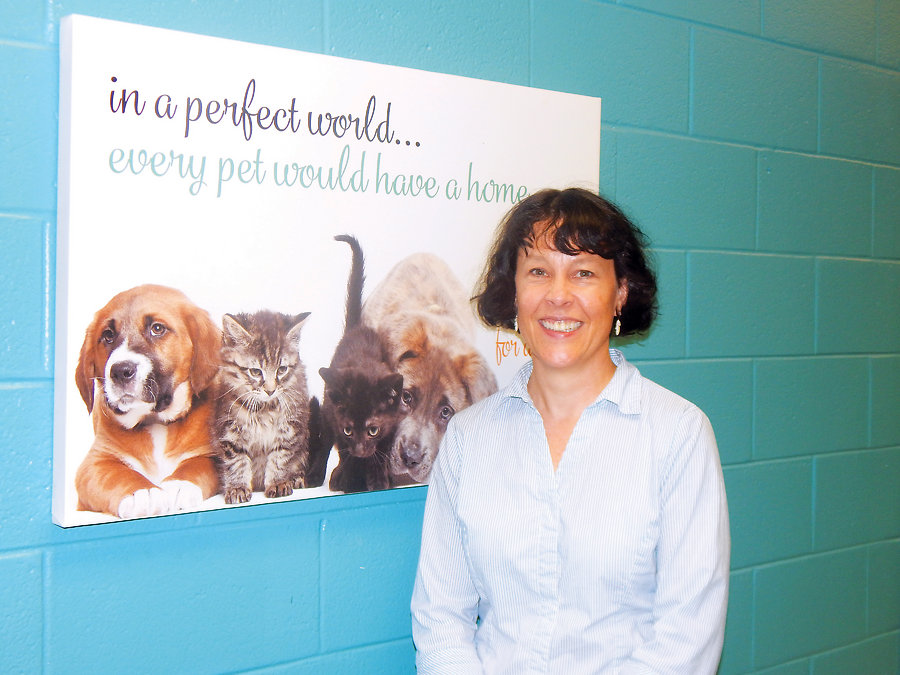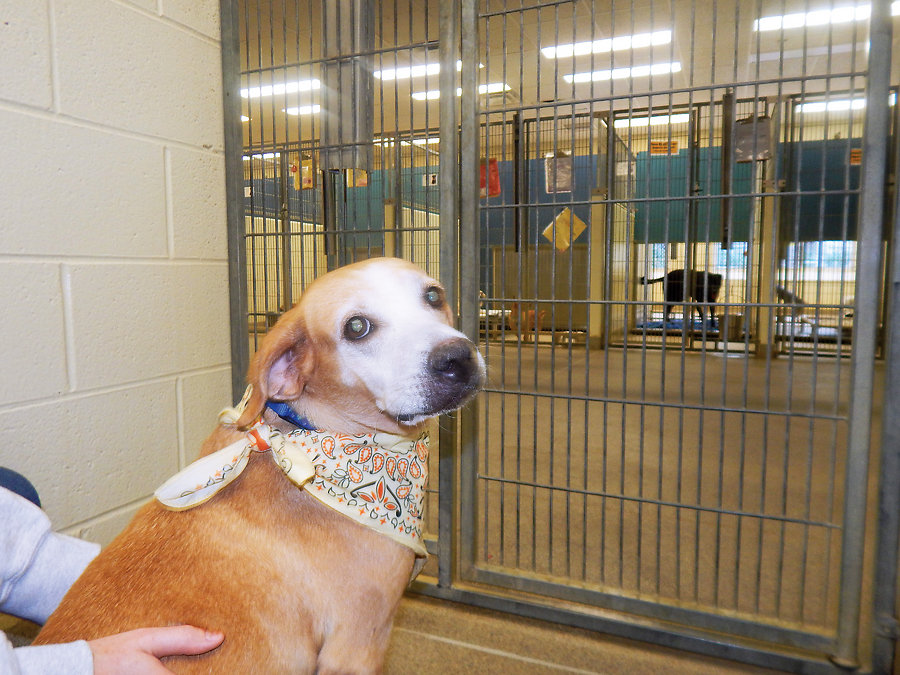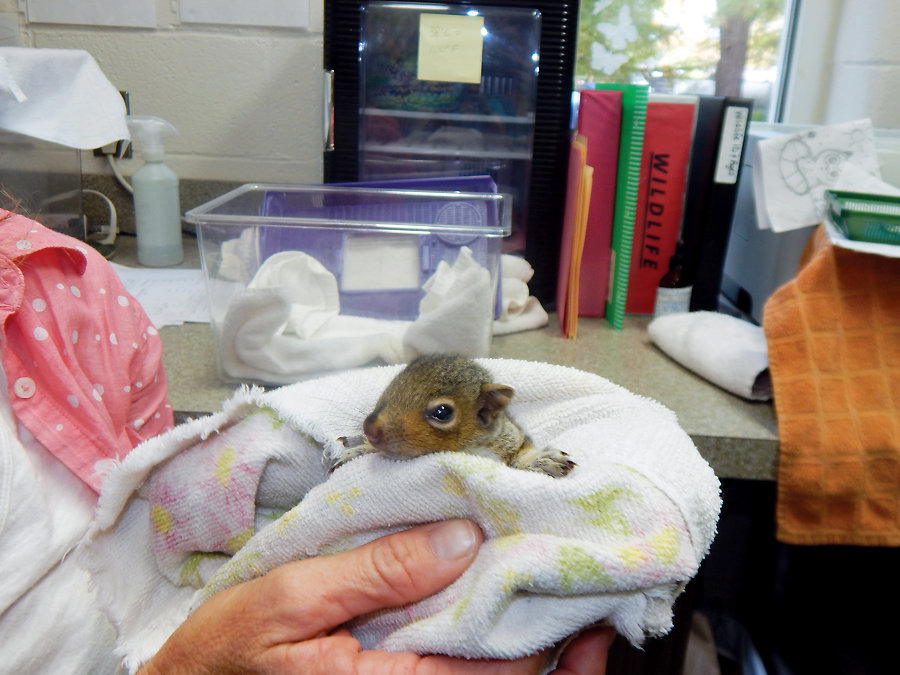 VIRGINIA BEACH SOCIETY FOR THE PREVENTION OF CRUELTY TO ANIMALS Heroes with a heart for animals by Angela Slevin In a natural disaster, what organization helps lost and wounded pets and wildlife survive? Who bottle feeds tiny kittens, puppies and baby squirrels when their mamas can't care for them? And who unites sad, lonely creatures with loving families? The Virginia Beach Society for the Prevention of Cruelty to Animals. Located on southern Holland Road in Virginia Beach, the VBSPCA is a welcoming place. Rosebushes adorn the curb, the lobby has a fresh smell, and Cleo, an Amazon yellow nape parrot, greets visitors. Kathy Shambo, Director of Humane Education, has been with the VBSPCA for almost 13 years. She started as a volunteer, and today runs programs to teach children and adults about domestic animals and wildlife. Kathy is originally from Vermont. The VBSPCA has been educating people in the seven cities for over 40 years. Their mission is to create a more humane and responsible community by eliminating animal suffering while increasing human compassion. One of their most successful programs is Compassion Classroom, started 21 years ago with just two schools in Virginia Beach participating. Today, 62 schools in Norfolk, Chesapeake and Virginia Beach participate in this program. A member of the VBPSCA visits a school about once a month and brings along one or two of the shelter animals for the children to see and pet. Their lesson dovetails with the school's curriculum: if the kids are learning about ancient Egypt, the lesson will be about cats in ancient Egypt and how they were domesticated. The feedback about this program has been extremely positive Another great program is Vet for a Day for six to 10+ year olds. Children spend the day at the VBSPCA and care for the many kinds of animals at the shelter. "I think this program has had a powerful effect. Over the years, I've seen the kids who came for Vet for a Day return for summer camp, and then return as junior volunteers, and then go to veterinary school. I feel like my nest empties every spring when I send them off to college. It's fun to say, "I knew them when they were only this big!' " Kathy exclaims.  VBSPCA Director of Humane Education, Kathy Shambo The VBSPCA works with Animal Control to preserve our wildlife. They take in many kinds of animals, including unweaned kittens that must be bottle fed every two hours, baby squirrels that have been blown out of trees during storms, raccoons, foxes, river otters, turtles, fawns, Eastern cottontail rabbits and possums. They are a triage center for wild animals, giving them x-rays and fluids, and getting them stabilized. Kittens will eventually be adopted, but wild animals must be transported to home-based rehabbers who complete their recovery and return them to their natural habitat. This drive to rescue helpless animals extends to well outside our state. Jenny Teed, Director of Operations, went to both Texas and Puerto Rico this September to help save animals from the flood waters. She rescued dogs, cats, even chickens. Some animals were transferred to Virginia Beach, including a medium sized adult female Lab named Jitterbug, who is well behaved and sweet as pie, and available for adoption. When one adopts instead of buying a pet, a homeless, unloved creature is given a second chance to have a happy, safe life. Every year, the VBSPCA takes in about 4,000 animals. At any given time, they only have capacity for about 400. That's why it's critical to adopt or foster animals. When one adopts instead of buying a pet, a homeless, unloved creature is given a second chance to have a happy, safe life. An adopted pet is every bit as loving, intelligent and loyal as any purchased pet. One can choose a pet of any age: puppies or older, previously trained dogs, kittens or mature cats, lovies who are familiar with the rules of a home. These pets are often already spayed or neutered, and vaccinated. Think about the fact that perhaps they once had a loving family, and a warm, soft place to call home. Wouldn't it be wonderful to return them to that situation again? Temporary foster pet parents are also needed. Sometimes, animals have medical conditions that require special care, like a broken leg, or they need bottle feeding every two hours. They would do better in a private home instead of the shelter. Foster homes are important for young puppies and kittens so they can receive proper socialization. They generally stay in foster homes until they are old enough to be spayed or neutered.  Jitterbug, a rescue from Puerto Rico, ready for adoption There are a few different ways that pets find themselves at the VBSPCA. Most of them are surrendered when people move out of or into the area because their new landlord doesn't permit animals over a certain weight. Most of these moves are not made by the military, but by civilians. Only 25 percent of pets are turned in by members of the military. The Helping Out Pets Everywhere program, or HOPE, assists people who are in a transitory situation so they don't have to give up their pets. For example, a fire could force someone to live in a hotel that doesn't accept pets until their home is rebuilt. Through this program, the VBSPCA has worked with groups like Samaritan House to care for the pets of victims of domestic violence while they are getting safe and back on their feet. "We would rather care for these pets and reunite them with their owners than have them surrendered and put up for adoption. This is a special circumstance, and we want to help," Kathy explains. Puppy mill and pet hoarding rescues are often on the news these days. When such conditions come to the ears of the Humane Society of the U.S. and the ASPCA New York, Kathy's shelter is contacted to arrange for pet transfers to this area. Kathy is proud that they are one of the top 10 shelters in the nation with whom the HSUS partners. These particular rescues have many medical issues because no preventative care like heartworm medication was given, no grooming was done, they have infections, and they're antisocial because puppy mill operators don't really talk to or touch them. In hoarding situations, the person believes they're helping the animals, but they don't realize they can't properly care for so many. To help, volunteers are always needed and welcome. Children age 13-17 can be junior volunteers, and those 18 years or older can go into the adult program. There is a brief orientation and training session. Certain items are needed to care for the animals as well. There is a wish list on their website which includes items such as heating pads (without automatic shutoff), peanut butter, cleaning supplies, baby wipes, newspaper, gently used linens (towels, washcloths, blankets), shredded paper (cut long-ways, no cross cut shreds), shoeboxes, empty paper towel/toilet paper rolls, empty prescription bottles with caps, zip top bags of all sizes, and more. Too busy to drop off donations? There is an Amazon.com wish list, too, which includes many kinds of supplies like dog bowls, special food for rabbits, guinea pigs, mice, gerbils, puppies, kittens, dogs and cats, habitats for the smaller animals, treats and enrichment toys, training pads, basic medical supplies and more. Just make your purchase on Amazon and the donated items will be sent right to the VBSPCA. For more information on programs, volunteering and events, go to www.vbspca.com. The VBSPCA partners with Animal Control and neighboring shelters to educate children and adults, and to care for animals. Kathy affirms, "We've developed a great network of rescues and animal control shelters. Working together, we can do more. We all have the same mission." Humans have treasured companion animals for centuries. As the world changes, we can make sure the most vulnerable in our society do not suffer.  One of about 200 rescued baby squirrels which will be rehabilitated and released Virginia Beach SPCA 3040 Holland Road Virginia Beach, VA 23453 757-427-0070 http://www.vbspca.com |